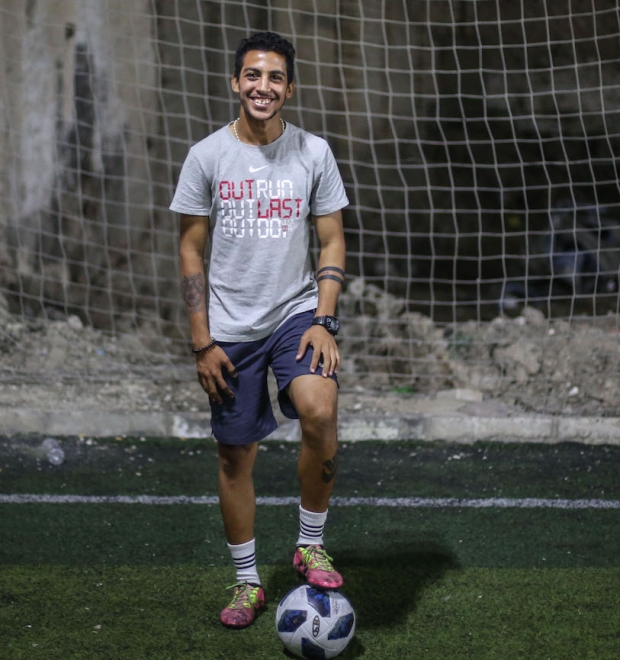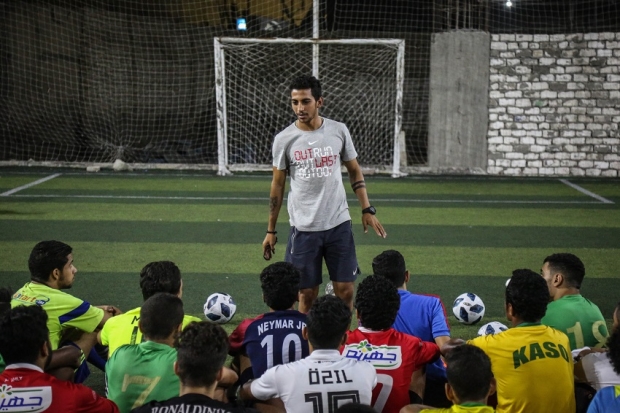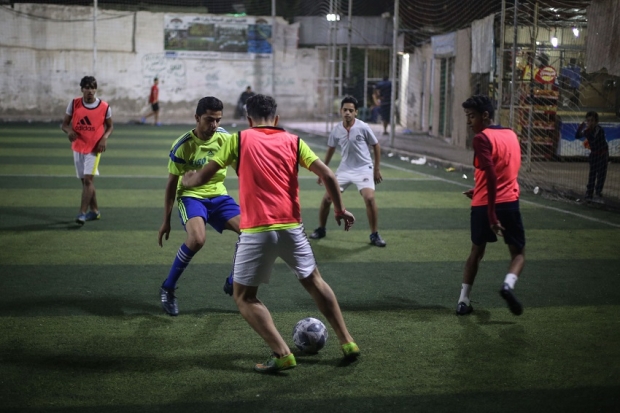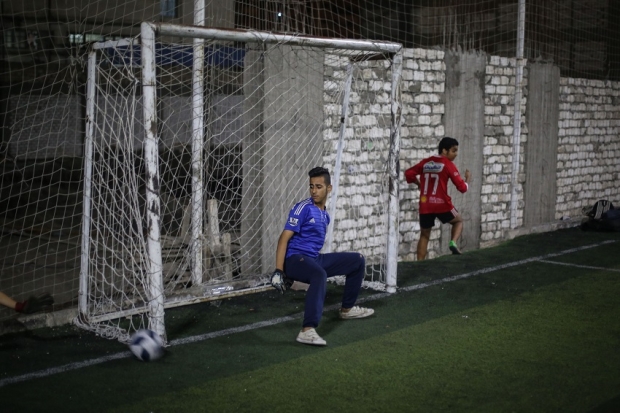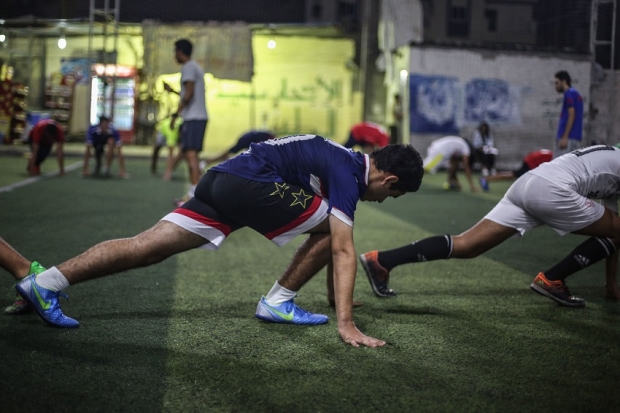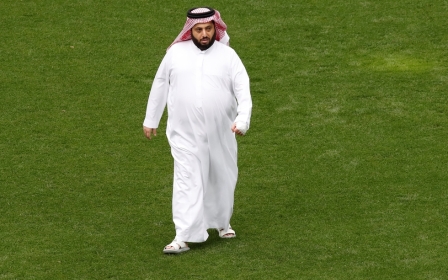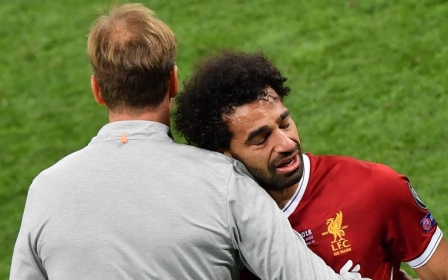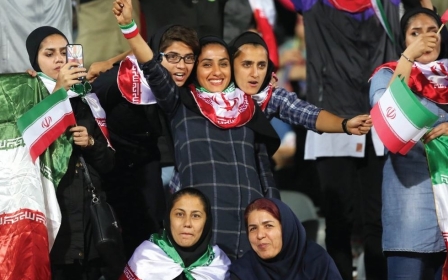Coptic Christian football academy fights against discrimination in Egypt
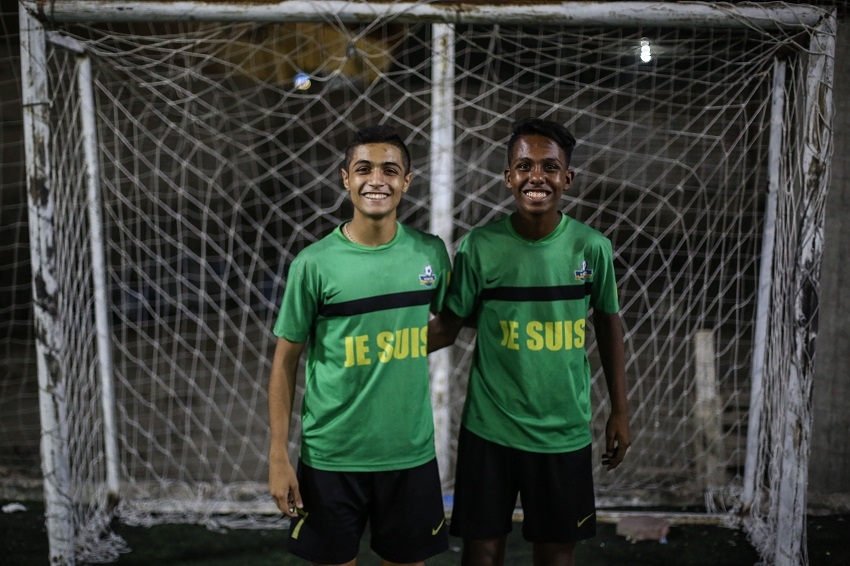
ALEXANDRIA - Mina Bindari, 23, never misses weekly practice with the players of Je Suis, a football academy which he claims is the first for Coptic Christians in Egypt.
Every Saturday from 8pm until midnight, Bindari coaches about 150 footballers of various ages at the Alex Sports Stadium, a football field in Alexandria's Victoria area that is commonly rented by sports enthusiasts.
The coach, who has thick dark hair, a 5-o'clock shadow and is wearing pink football boots, trains alongside the men. Were it not for his whistle, you might even mistake him for one of the players. Bindari is so committed to the team that he has the words Je Suis inked onto his arm, among other tattoos.
He says his passion is rooted in his desire to give the footballers a chance to excel at the sport in an industry that he and others say discriminates against Coptic Christians.
Amid broader tensions between Copts and Muslims, football in Egypt has increasingly been intertwined with religion.
Last month, at least seven Coptic Christians were killed by armed men, who opened fire on a bus carrying worshippers back from a monastery in the central province of Minya.
I started playing football when I was 12 at youth centres, on the streets and in independent stadiums
- Mina Bindari, founder of Je Suis
The Islamic State group claimed responsibility for the attack, though it provided no evidence of its involvement.
The attack was carried out along the same route targeted in May last year, when 28 Copts were killed and dozens more injured.
Though Egypt is at least 10 percent Coptic Christian, the sunni-majority country's national team and premier league have no Coptic players.
‘Nothing is impossible’
Bindari, who is in his final year of undergraduate studies at the Al-Soyouf Institute for Computer Science in Alexandria, said that he had experienced discrimination himself at the age of 14, when he was scouted by a local coach who suggested he try out at the Al Ittihad Alexandria Club.
Two years later, he tried out for Abu Qair, another local club, and says he was similarly rejected without reason. Bindari took matters into his own hands and decided to establish the football Academy in 2015.
It’s unreasonable that in the history of the Egyptian team, there was never a good enough Christian player, except for Hany Ramzy
- Mina Bindari
Within four years, Bindari had accumulated enough savings – some 15,000 Egyptian pounds ($835) – to set up Je Suis.
The training school grew steadily, with the help of word of mouth, as Christian footballers who had been turned away from other clubs finally found a place to come together.
Bindari says he chose the name Je Suis, meaning ‘I am’ in French, “to send the message that nothing is impossible” and because he likes how the phrase sounds. The academy’s footballers, aged 18 - 33, currently compete in the fourth division under the name Egypt Victoria Club.
Je Suis, as yet, has no headquarters and relies on monthly subscriptions of 100 Egyptian Pounds ($6) to maintain operations. The funds are used to rent local football fields, like the Alex Sports Stadium, and to purchase sports clothing and equipment.
‘Pure racism’
Bishoy Malak, 14, says that he also experienced discrimination on the football field prior to joining Je Suis. In 2016, he tried out at various Egyptian clubs, including the second division Olympic Club. The footballer says he was asked about his name and then told that someone would get back to him. No one ever did, Malak says, even though players are usually told whether they’ve been rejected or accepted after tryouts.
Specifically, for Copts, religion can be an obstacle
- Patrick George, former footballer and researcher at EIPR
Bolas Fayez, 18, says he had a similar experience. In 2014, Fayez tried out at the Petrojet club. Although the footballer was asked for his phone number, he never heard back from the team. He suspected that, like Bindari and Malak, he was turned away due to his name and religion, and joined Je Suis in 2015.
“I see discrimination against Christian players as pure racism,” Fayez tells MEE. “It’s unreasonable that in the history of the Egyptian team, there was never a good enough Christian player, except for Hany Ramzy. There have been many Christian talents, but none were given the opportunity.”
He made a name for himself at the Al Ahly Club before joining the Egyptian national team, which qualified for the 1990 World Cup in Italy. Ramzy is currently the assistant coach on the team.
Other Coptic players that were able to break into the league level include Ashraf Youssef, a former defender who played for a number of teams, among them Zamalek; Nasser Farouk, former goalkeeper with Mahalla and Asyut Petrol; and Mohsen Abdel-Massih, left-back with Ismaily between 1978-1988.
Abdel-Massih said in an interview with the Orthodox Coptic newspaper Watani in September 2016, that he was rejected from the national team “for not being able to read the Qur’an”.
Bindari says these successes are more an exception than the rule and that discrimination often starts early on in a Coptic football player’s career.
On his part, the Al Ittihad Alexandria manager Walid Salah El-din disagreed, stressing that there is no discrimination in Egyptian football.
“I am completely not convinced that there is discrimination based on religion in football. I played along Hani Ramzy in the Egyptian national team and never saw anything of the sort. There was no difference between us inside the national team. I was also present in Alahly club as a youth team trainer and did not see discrimination in the entry tests,” he told MEE. “Entry tests in clubs are difficult and a choice is based on talent not religion…This could be individual cases or a misunderstanding on part of the player himself."
But Mina Essam, a 13-year-old Copt who had hoped to become a professional goalkeeper, says he faced discrimination in 2016. Essam had tried out for a spot as a goalkeeper for Al Ahly but says he was ultimately rejected. Essam suspects that he was shunned after his name and religion were announced. The footballer usually participates in summer tournaments organised by the church.
“Specifically for Copts religion can be an obstacle,” says Patrick George, a former footballer and researcher at the Egyptian Initiative for Personal Rights (EIPR). “It prevents us from fulfilling our careers in the face of systematic persecution.”
George says he personally experienced harassment, sometimes in the form of sarcasm, pertaining to his name when he trained with the El Mansoura club as a 10-year-old boy. “The problem is deeply rooted in the soccer system in Egypt as in many other important fields,” he explains. “These issues of systematic racism towards minorities need mediation.”
Demanding representation
The situation for Coptic Christians struggling to become professional footballers due to what they believe is discrimination has become so dire that some high-profile sportsmen have spoken out publicly about it.
Ahmed Hossam Hussein Abdelhamid, a former football player known as Mido, said in April this year in an interview on the DMC television channel, that Copts in Egypt are exposed to racism and discrimination from club management and coaches because of their religion.
The discrimination against Christian players in Egypt does not come from the government or from the football federation, but rather from clubs and coaches
- Mina Bindari
Mido, who also played for a number of teams outside of Egypt, including Tottenham Hotspur, Marseilles and Roma, implored sports officials in his home country to respond proactively to the discrimination by adding articles to national sports laws that would demand at least 10 percent Christian representation in Egyptian clubs.
"The discrimination against Christian players in Egypt does not come from the government or from the football federation, but rather from clubs and coaches,” says Bindari. “There are some coaches in Egypt, most of whom are in the junior divisions, that I would describe as having sick minds, with a lot of hatred and racism against Christians in their hearts."
Moving forward
Two months ago, Malak, the 14-year-old aspiring footballer, joined Je Suis after learning about the academy from some of his friends.
Malak is presently a member of the junior division of the Egypt Victoria Club and hopes to continue growing with the team.
Bindari, too, is optimistic.
He hopes the squad will continue to improve its skills and climb the league until it qualifies for the premier division and then perhaps some of its players may even qualify for the national team. He also plans to expand the academy’s operations by opening branches in several other Egyptian cities, including Damanhur, Mahalla and Cairo.
“We work in very difficult circumstances,” says Bindari. “But we are trying to achieve something positive."
This article is available in French on Middle East Eye French edition.
Stay informed with MEE's newsletters
Sign up to get the latest alerts, insights and analysis, starting with Turkey Unpacked
Middle East Eye delivers independent and unrivalled coverage and analysis of the Middle East, North Africa and beyond. To learn more about republishing this content and the associated fees, please fill out this form. More about MEE can be found here.


